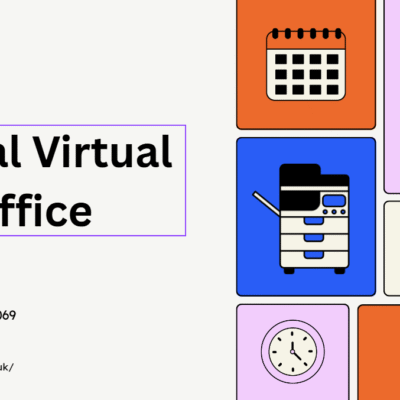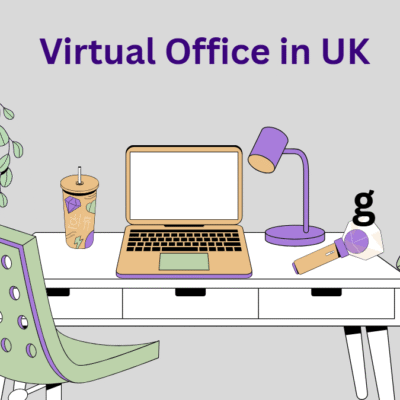1. Introduction 🚀
In today’s flexible business landscape, renting a virtual office has become a game-changer for entrepreneurs, freelancers, start-ups, and growing enterprises alike. Why pay hefty rent for unused desks when you can project a premium image and access services like mail handling, call answering, and meeting rooms—all without a physical lease? In the UK, virtual office solutions combine practicality, affordability, and prestige, offering a smarter way to do business.
In this guide, we’ll explore:
-
What a virtual office is
-
Why UK businesses rent virtual offices
-
Key services included
-
Pros and cons
-
Choosing the right provider
-
Legal and compliance considerations
-
Cost expectations
-
How to set one up
Let’s start by breaking it down.
2. What Is a Virtual Office?
A virtual office provides all the benefits of a traditional office—like mailing address, telephone services, and occasional workspace—without the expense or commitment of leasing a physical office. Key features include:
-
Prestigious business address for mail and official registration
-
Mail handling, scanning, and forwarding
-
Business telephone number, often with call answering
-
Access to meeting rooms and coworking space, by the hour or day
-
Optional extras like virtual receptionists, fax-to-email, and admin support
You maintain a professional presence on paper and online, while your actual work happens wherever suits you—home, co-working space, or café.
3. Why UK Businesses Rent Virtual Offices
3.1 Reduce Overheads
Renting physical office space—even small—can be costly in UK cities. Virtual offices offer a cost-effective alternative.
3.2 Professional Location Image
Whether in London, Edinburgh, or Manchester, a prime address adds credibility for clients, investors, and partners.
3.3 Home-Based Privacy
Freelancers and small business owners can keep their home address private by using a virtual business address.
3.4 Legal Requirements
You can legally register your company in the UK—even with Companies House—using a virtual address, provided it meets compliance standards.
3.5 Flexibility to Scale
Start lean with a basic package, then upgrade to call support, coworking access, or admin tools as you grow.
3.6 Hybrid Working Support
Perfect for hybrid teams: You work remotely most days, but meet in professional spaces when needed.
4. Services Included in a Virtual Office
4.1 Business Address & Mail Handling
Your mail is received, scanned, forwarded, or securely stored, depending on your package.
4.2 Telephone Services
Many providers offer call forwarding, dedicated local numbers, voicemail, or live receptionists.
4.3 Meeting Rooms & Coworking Access
Book rooms for pitches, interviews, or all-hands meetings—even by the hour.
4.4 Virtual Receptionist
On-demand reception supports branding without permanent staff.
4.5 Admin Add-Ons
Receive fax-to-email, diary support, admin assistance, or offline reception services.
5. Pros and Cons of Renting a Virtual Office
✅ Pros
-
Cost-effective and flexible
-
Enhances professional branding
-
Maintains privacy and compliance
-
Access to meeting spaces as needed
-
Easy to scale services
⚠️ Cons
-
Limited physical space and storage
-
No permanent team presence onsite
-
Varying service quality between providers
-
Extra charges may apply (e.g. mail forwarding, meeting room booking)
Choosing a reputable provider mitigates most of the downsides.
6. Choosing the Right Provider
6.1 Location Prestige
Select an address that aligns with your branding—City centres for importance, suburbs for cost-efficiency.
6.2 Service Transparency
Check what’s included: mail scanning delays, receptionist staffing, room availability.
6.3 Compliance Standards
Providers should follow Anti-Money Laundering (AML) rules and ID verification for clients.
6.4 Upgrade Options
Ensure you can easily add phone reception, workspace access, or admin support over time.
6.5 Hidden Costs
Look for fees on mail forwarding, room bookings, phone usage or cancellations.
6.6 Customer Reviews
Choose providers with reliable communication, support reputation, and clear pricing.
7. Legal & Compliance Considerations
7.1 Company Registration
Companies registered with Companies House must have a UK postal address. Virtual offices meet this requirement.
7.2 HMRC Communication
Ensure HMRC notices will reach you via your virtual mail service.
7.3 Data Protection
Any scanned documents must be handled in line with UK GDPR.
7.4 AML Verification
Reputable providers verify identity to prevent fraud and money laundering.
8. What You Can Expect to Pay
Pricing varies based on location and services. Typical UK packages include:
-
Basic Address + Mail Scanning: £15–£50/month
-
Address + Telephone Number + Voicemail: £30–£80/month
-
Premium Packages (with call answering, meeting rooms): £80–£150+/month
-
Additional room bookings or receptionist time billed hourly.
9. How to Rent a Virtual Office in the UK: Step-by-Step
-
Define Your Needs
What services are essential now and in the future? -
Research Providers
Prioritise locations, compliance, and customer reviews. -
Trial Period
Many providers offer 1-month trials with no long-term commitment. -
Fulfil Compliance
Provide ID and business documents for AML checks. -
Set Up Your Account
Start with mail handling and update your address for official use. -
Upgrade as Needed
Add call handling, meeting room access, or admin services later. -
Use Your Address
Update your website, email signatures, invoices and company registrations.
10. Smart Practices for Maximising Value
-
Keep your mail scanned and forwarded monthly.
-
Log and review all calls and messages promptly.
-
Maintain regular usage of coworking or meeting spaces.
-
Leverage location credentials in Google Business Profile and marketing materials.
-
Use your virtual presence to enhance local SEO and discoverability.
11. Case Studies at a Glance
Freelancer in Sheffield: One-person design studio uses virtual address and occasional meeting room bookings—projects city presence without high rent.
Online Retail Start-Up: Begins with basic service; adds phone and call forwarding as customer support needs grow.
Expanding SMΕ: Provides HQ in London when pitching to investors; retains remote team and expands gradually.
12. Common Myths Debunked
-
“Virtual means fake presence” – Professional providers use real buildings and manage mail reliably.
-
“Too impersonal” – You can add receptionists, phone services, and meeting spaces when needed.
-
“Only for start-ups” – Virtual offices are strategic assets for growing SMEs too.
-
“Hidden fees everywhere” – Read contracts carefully; reputable firms are transparent.
13. Future of Virtual Offices
-
Hybrid models: combining virtual services with flexible desk access.
-
AI assistants: for receptionist tasks and administration.
-
Smart office memberships: with physical and virtual benefits.
-
Better integration: postal forwarding tied to services and scheduling tools.
14. Final Thoughts
Renting a virtual office in the UK offers a compelling blend of professionalism, flexibility, and cost savings—making it an excellent choice for small businesses, remote teams, and start-ups. With increasingly sophisticated packages and services, it’s more accessible than ever to build a professional presence without the weight of a physical lease.
Ready to Rent a Virtual Office?
Explore trusted UK virtual office providers today—set yourself up with a premium business address, professional services, and a scalable model to support your growth, all while keeping overheads low.





